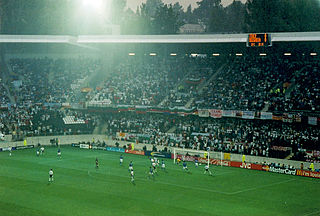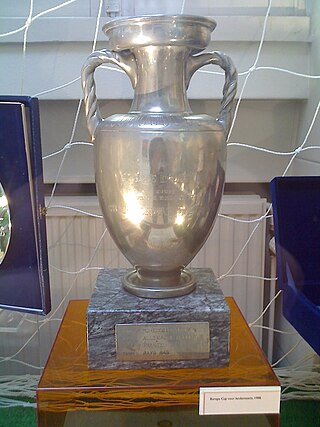Euro 1996
Group stage
| Pos | Team | Pld | W | D | L | GF | GA | GD | Pts | Qualification |
|---|---|---|---|---|---|---|---|---|---|---|
| 1 | 3 | 2 | 1 | 0 | 5 | 2 | +3 | 7 | Advance to knockout stage | |
| 2 | 3 | 1 | 2 | 0 | 4 | 3 | +1 | 5 | ||
| 3 | 3 | 1 | 1 | 1 | 3 | 4 | −1 | 4 | ||
| 4 | 3 | 0 | 0 | 3 | 1 | 4 | −3 | 0 |
As of 2020, Bulgaria have qualified for two UEFA European Championships, in 1996 and 2004. However, they did not survive the first round at any occasion. While Bulgaria achieved a win (and a draw) at the 1996 tournament, they lost all their matches in the 2004 edition.
| Pos | Team | Pld | W | D | L | GF | GA | GD | Pts | Qualification |
|---|---|---|---|---|---|---|---|---|---|---|
| 1 | 3 | 2 | 1 | 0 | 5 | 2 | +3 | 7 | Advance to knockout stage | |
| 2 | 3 | 1 | 2 | 0 | 4 | 3 | +1 | 5 | ||
| 3 | 3 | 1 | 1 | 1 | 3 | 4 | −1 | 4 | ||
| 4 | 3 | 0 | 0 | 3 | 1 | 4 | −3 | 0 |
| Pos | Team | Pld | W | D | L | GF | GA | GD | Pts | Qualification |
|---|---|---|---|---|---|---|---|---|---|---|
| 1 | 3 | 1 | 2 | 0 | 8 | 3 | +5 | 5 [lower-alpha 1] | Advance to knockout stage | |
| 2 | 3 | 1 | 2 | 0 | 4 | 2 | +2 | 5 [lower-alpha 1] | ||
| 3 | 3 | 1 | 2 | 0 | 3 | 2 | +1 | 5 [lower-alpha 1] | ||
| 4 | 3 | 0 | 0 | 3 | 1 | 9 | −8 | 0 |
| UEFA European Championship record | ||||||||
|---|---|---|---|---|---|---|---|---|
| Year | Round | Position | Pld | W | D* | L | GF | GA |
| | Did not qualify | |||||||
| | ||||||||
| | ||||||||
| | ||||||||
| | ||||||||
| | ||||||||
| | ||||||||
| | ||||||||
| | ||||||||
| | Group stage | 11th | 3 | 1 | 1 | 1 | 3 | 4 |
| | Did not qualify | |||||||
| | Group stage | 16th | 3 | 0 | 0 | 3 | 1 | 9 |
| | Did not qualify | |||||||
| | ||||||||
| | ||||||||
| | ||||||||
| | ||||||||
| | To be determined | |||||||
| | ||||||||
| Total | Group stage | 2/17 | 6 | 1 | 1 | 4 | 4 | 13 |

The 2004 UEFA European Football Championship, commonly referred to as Euro 2004, was the 12th edition of the UEFA European Championship, a quadrennial football competition contested by the men's national teams of UEFA member associations. The final tournament was hosted for the first time in Portugal, from 12 June to 4 July 2004. A total of 31 matches were played in ten venues across eight cities – Aveiro, Braga, Coimbra, Guimarães, Faro/Loulé, Leiria, Lisbon, and Porto.

Group C of UEFA Euro 2004 was one of four groups in the final tournament's initial group stage. It began on 14 June and was completed on 22 June. The group consisted of Italy, Denmark, Sweden and Bulgaria.

Group B of UEFA Euro 1996 was one of four groups in the final tournament's initial group stage. It began on 9 June and was completed on 18 June. The group consisted of France, Spain, Bulgaria and Romania.
Russia have participated in twelve UEFA European Championships, the second-most among all participants of the Euro after Germany, five of which were as the Soviet Union and one of which was representing the CIS. As the Soviet Union, their best performance was becoming champions in the inaugural 1960 edition in France, while their best performance as Russia came in the 2008 tournament held in Austria and Switzerland, when they reached the semi-finals.
The UEFA European Championship is one of the major competitive international football tournaments, first played in 1960. The finals stage of the tournament takes place every four years, with a qualifying competition beforehand. The sixteenth tournament was held across Europe in 2021.
The UEFA European Championship is the main football competition of the men's national football teams governed by UEFA. Held every four years since 1960, in the even-numbered year between World Cup tournaments, it was originally called the UEFA European Nations Cup, changing to the current name in 1968. Starting with the 1996 tournament, specific championships are often referred to in the form "Euro 2008" or whichever year is appropriate. Prior to entering the tournament all teams other than the host nations compete in a qualifying process.
The UEFA European Championship is one of the major competitive international football tournaments, first played in 1960, whose finals stage has been held every four years.

The Netherlands national football team has appeared in ten UEFA European Championship tournaments, with an upcoming eleventh appearance in 2024. They first participated in 1976, and won the title in 1988. With Belgium, the Netherlands co-hosted the 2000 tournament. The team did not enter the first tournament in 1960, and did not qualify in 1964, 1968, 1972, 1984 or 2016.
The UEFA European Championship is the main football competition of the men's national football teams governed by UEFA. Held every four years since 1960, in the even-numbered year between FIFA World Cup tournaments, it was originally called the UEFA European Nations' Cup, changing to the current name in 1968.
The UEFA European Championship is the main football competition of the men's national teams governed by UEFA. Held every four years since 1960, in the even-numbered year between World Cup tournaments, it was originally called the UEFA European Nations' Cup, changing to the current name in 1968. Starting with the 1996 tournament, specific championships are often referred to in the form "UEFA Euro (year)”. Prior to entering the tournament, all teams other than the host nations compete in a qualifying process.
Greece have qualified for only four out of sixteen UEFA European Championships, but crowned themselves European champions in 2004. At Euro 2004 they beat hosts Portugal in the final, resulting in their first major tournament win.
The Denmark national football team have participated in nine UEFA European Championships, and won the tournament once. Their first tournament was the 1964 edition, in which they secured fourth place. In the final of UEFA Euro 1992 in Sweden, Denmark's 2–0 victory over Germany resulted in their first major tournament title.
Italy have participated in ten UEFA European Championships, and reached the final on four occasions. They became champions as hosts in 1968, the first European Championship they qualified for, and finished as runners-up in 2000 and 2012, before winning their second continental championship at Euro 2020.
Portugal have participated in eight editions of the UEFA European Championship, with an upcoming ninth appearance in 2024. Their first tournament was in 1984, and the side have advanced past the group stage in every edition they've participated in so far. Portugal have reached the semi-finals on five occasions, and reached the final as hosts in 2004, however losing to tournament underdogs Greece. They captured their first major tournament win after defeating hosts France 1–0 in the final of Euro 2016.
Turkey have participated at five UEFA European Championships so far, with an upcoming sixth appearance in 2024; the first finals they qualified for was Euro 1996. Their best European performance to date was reaching the semi-finals in 2008, after winning their quarter-final match against Croatia on penalties.
As the Czech Republic is considered to be the successor team of Czechoslovakia by FIFA and UEFA, they have participated in ten UEFA European Championships; three of which were as Czechoslovakia and seven of which were as the Czech Republic, as well as an upcoming eighth appearance in 2024. As Czechoslovakia, they became European champions in 1976. As the Czech Republic, they have qualified for every European Championship that they have played qualifiers for, and were runners-up at Euro 1996.
Romania have appeared at five UEFA European Championships between 1984 and 2016, with an upcoming sixth appearance in 2024. Their best performance so far was reaching the quarter-finals of Euro 2000, when they were eliminated by eventual tournament runners-up Italy.
As of 2023, Switzerland have appeared at five UEFA European Championships, between 1996 and 2020, with an upcoming sixth appearance in 2024. They have advanced past the first round twice, reaching the last 16 in 2016 and the quarter-finals in 2020 for the first time, before being eliminated by Spain on penalties following a 1–1 draw after extra time.
The UEFA European Championship is one of the major competitive international football tournaments, first played in 1960, whose finals stage has been held every four years, with the sixteenth staging of the competition occurring in 2021.
In September 2018, the UEFA Nations League starring all European nations officially commenced. This competition has been created to make the international breaks more competitive and interesting and remove as much friendly matches as possible. The teams are divided into four leagues of four groups, from League A to League D. The winners of each group from League A get to play the Finals, constituted of the semi-finals, a third-place play-off, and the final.